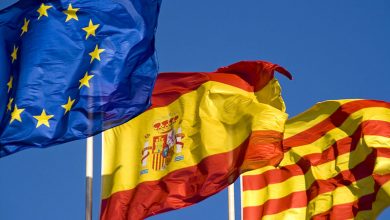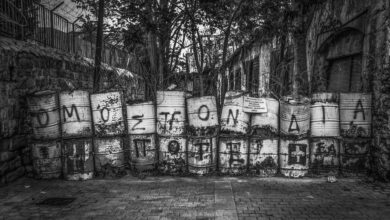George Orwell: His Story and Legacy

George Orwell has always been a hero to me. I should not be surprised then to find myself writing about him, only I am. He is English; very English. While as late as the 1960s, English letters were still reminiscing about the Grand Tour – the mandatory trip to Florence and Rome that was a requisite to an aristocrat’s upbringing – the average Englishman considered the guest Italian worker more akin to the rubble on the building sites where they often worked. The allies had won the war. Snobbism for all things English was the rule, even though the British Empire had already passed its zenith.
England, like the rest of Europe, has changed enormously since that time. Europe itself is happily learning to put all these national and class conceits behind, although some think they can now turn them towards third world immigrants. Despite those anticipated changes, writers like George Orwell stand above their époque leading us by example into a future few could see at the time.
The Engaged Writer
Writers since the time of the Greeks and Romans have addressed governing the polis as an integral part of their art and vocation. During the Middle Ages, Dante and Machiavelli continued these traditions. In France, Voltaire, Rousseau and d’Alembert prepared the path for Chamfort, Mirabeau, then Zola and Hugo. Schiller and Heine played similar roles in German literature.
In the wake of World War II and the flowering of philosophical thought in Europe, the old was shed in a search for new social paradigms. The ‘engaged writer’ became a thing in contemporary parlance with the existential philosophy of Sartre, though writers had often embraced social activism before. This now articulated existential posture was embodied in the writing and social action of Camus and his contemporaries.
In a world governed by existence, the writer was no longer assigned his or her place in society by fate or religion; but chose it. The ‘nothing’ inside Sartre’s seminal work Being and Nothingness allowed man to create his existence and its meaning from whole cloth. Few were better suited to do this than the writer who combined intellect with action.
Enter Eric Blair
Much of the reversal of values finding its expression in philosophy and literature was created by the war – in fact, two World Wars – as well as an intervening pandemic and economic depression. It is not surprising then to find engaged writers preceding by a few years Sartre’s discovery of them. Such a writer was George Orwell, born Eric Blair. Similar engagement characterised many others, both in the pre and post-war period. Had the challenges of the time solicited such an ardent response?
For Eric Blair, who had come from Burmese service, the path to writing was different than that of his aristocrat peers. From little England and a scholarship to Eton to run off to Paris, joining the anarchists to fight in Spain’s civil war, and even writing and organising for the British Labour Party, his accomplishments are a heroic feat for his time and class.

Upbringing and Background
Eric Blair was born in Burma the son of an ennobled bourgeois family who had lost their fortune and found their way to a middle-class existence through the sinecure of foreign service. Eric was too young to know Burma when he returned to England with his mother and sister to await their father’s retirement shortly before the birth of a younger sister.
To understand Eric, or more particularly what he refused to become, it is necessary to understand the rigid class system of the period. The system in its current form dates from the Normans. The Normans used their newfound power in invasion and defeat of the English at Hastings in 1066 to rule over the English nobility. The English were relegated to the status of minor nobility with circumspect local powers. Status was guarded jealousy.
The Normand-English now allied with the royal houses of Europe were at the pinnacle of the hierarchy; English dukes, counts and minor nobles ruled locally at their pleasure. Unlike on the continent, the English yeoman was nearly completely alienated from his ultimate rulers. For a time after the invasion, the Normans spoke French obliging the lower nobility to get on as they could linguistically. Latin was the second language of the educated, ahead of Anglo-Saxon English.
Even today, the multiplicity of class accents reflects these divisions. Ennoblement was a distinction meant to keep the system functioning and turn successful local functionaries into allies and members of the establishment. The boarding school system, itself separated into hierarchical tiers, reinforced the power of the upper classes through education.
The Boarding School System: Orwell’s Education
Eric Blair’s status put him at the bottom rungs of this system, though well above the toiling class. His family’s finances made climbing those rungs difficult. But he was fortunate in several ways and also enterprising. His studies paved the way for a partial scholarship. Both the first World War, which emptied the school dormitories of future officers for the front and his own success on the two and a half-day entry exam enabled Eric to obtain a place and scholarship to Eton at the upper limit of his class aspirations.

The boarding school system, especially his preparatory school Saint Cyprian’s, was a brutal and lonely experience that stunted the growth of many Englishman from Oscar Wilde to C.S. Lewis when it wasn’t producing hardened officers for the Empire. Orwell’s uniqueness began here as he did not accept the unreasonable demands of what C.S. Lewis, George Monbiot and Virginia Woolf call an ‘English pathology’. His own scathing critique of the school in Such, Such Were The Joys was so unique and disturbing at the time that it was rarely read and hardly republished.
A friend and fellow Saint Cyprian, Cyril Connolly, one of the few to also reject his school experience, writes of Eric (now George): “The remarkable thing about Orwell was that he alone among the boys was an intellectual and not a parrot, for he thought for himself, read Shaw and Samuel Butler, and rejected not only [St. Cyprian’s] but the war, the Empire, Kipling, Success and Character”. A false sense of ‘Success and Character’ was the principal mantra of the school’s education according to Connolly, and undoubtedly Orwell as well.
Early Reflections of George Orwell
Orwell’s rejection of the war in 1918 as a ‘meaningless slaughter’ was not yet cemented in stone. This would come later as he was still prone to youthful moments of patriotism. No longer working as hard at Eton he would not present himself for a scholarship to Oxford. That would end his schooling, a bourse a ‘sine qua non’ given family finances for university. This was hardly uncommon for the period, even for an Etonian.
It was the exam for the Imperial Police that he presented instead. Successfully competing, he received a posting to Burma where his ideas on imperialism, war and socialism would take further shape. The education, as inadequate as Orwell considered it, for he was a voracious reader beyond the confines of his courses, gave him a humanitarian culture and confidence. Experience of the world gave him material for reflection. He was fast becoming an engaged writer, a democratic socialist and humanist. In the eyes of the governing half of England though, he was, if not entirely a traitor to his class, on the margins of ‘acceptable’ behaviour’.
Spain and World War II
In 1936, Orwell left a grocery store that he had started with his wife to volunteer to fight with the anarchists and Trotskyites in Spain, After 115 days fighting on the Aragon front, he returned to England – not without a souvenir, having experienced a bullet to the neck and partial paralysis of the right arm and loss of his voice. Home, in England he found the Spanish Civil War had resolved nothing in Europe’s march to a continent-wide conflagration. Shortly thereafter, he captured his experience of the civil war in Homage To Catalonia, a book criticized both by the British Tory establishment and Labour which was decidedly pro-Moscow and anti-Trotskyite and anarchist.
Orwell was not surprised. The allies had let the fascists triumph in Spain next door while making all sorts of noise about Munich and the Sudetenland in the inaccessible heart of Europe. They would not have been able to stop Hitler there even if they had wanted to. Nearby Spain might well have been another story. The machinations of the communists too were clear to him.

Post-War
World War II had been anticipated by Orwell’s My Country Right or Left. Orwell was, when all was said and done despite his reservations, a patriot. Hitler had to be defeated. He still held out hope that all the killing might result in some sort of revolutionary moment, improving the conditions of the working class once and for all.
He tried in various ways to make himself useful to the war effort, including enlisting, but his tuberculosis always got in the way. Furthermore, he wrote for numerous publications, his insights becoming increasingly recognized as political reporting of the first order. Eventually, he was signed up as a program broadcaster for the BBC Far Eastern service, something between reporting and propaganda, which he was more than willing to do.
Major Works of George Orwell
George Orwell died in 1950 at the age of 46 from tuberculosis, which plagued him all his life and caused him to have several serious bouts of pneumonia. In spite of this, he led an active life and was a very prolific writer. He is survived by his adopted son with his first wife Eileen.
We can add to the works already cited, Wigan’s Pier, his tribute to the coal miners and the working class of northern England, written shortly before the war. His major works, Animal Farm and 1984 came after the war and are classics of world literature. The latter, written while he was ill from Tuberculosis, has given its name to regimes of dystopian tyranny, especially ‘Newspeak’, the invented language of the totalitarian state.
Reading Orwell has been somewhat distorted by the success of these major works. They are truly brilliant and classical works of world literature but they have themselves become tools of the propaganda he detested. These two books were used to portray Orwell as an anti-communist and defender of liberal capitalism. The former he was, though not religiously, his socialism leaned toward the Trotskyite, the latter he certainly was not.
Why Should You Read Orwell?
Today’s Europe was formed through two World Wars, the struggle between fascism, capitalism, communism and decolonization. Orwell was present at the forefront of these events as a journalist and writer. His keen eye of observer, lucid intelligence, experience and emphasis on clear expository writing makes him indispensable for understanding Europe’s formative years. Read and appreciated by both left and right, he cuts through much of the dross of ideologies to understand the fate of man in this tumultuous period.




![Photo of [OPINION] The European Union Needs its Own Nuclear Arsenal](https://mycountryeurope.com/wp-content/uploads/2020/03/French-President-Emmanuel-Macron-meets-military-officials-at-the-Ecole-Militaire-in-Paris-390x220.jpg)

The term Trotskyite is the Stalinist term, most people on the Left use the term Trotskyist. Orwell was alienated from Stalinism by the crushing of the independent Marxist party, the POUM, which had many in it who were friendly with Trotsky. The leader of the POUM, Andreu Nin was kidnapped by Riussian agents, tortured and murdered. The POUM leadership were put on trial in a Spanish version of the Russian trials. Many other murders and =kidnappings were done by Russian agents and their supporters during the War.